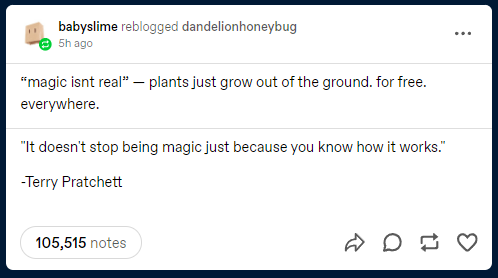this post was submitted on 28 Feb 2024
403 points (96.3% liked)
tumblr
3411 readers
724 users here now
Welcome to /c/tumblr, a place for all your tumblr screenshots and news.
Our Rules:
-
Keep it civil. We're all people here. Be respectful to one another.
-
No sexism, racism, homophobia, transphobia or any other flavor of bigotry. I should not need to explain this one.
-
Must be tumblr related. This one is kind of a given.
-
Try not to repost anything posted within the past month. Beyond that, go for it. Not everyone is on every site all the time.
-
No unnecessary negativity. Just because you don't like a thing doesn't mean that you need to spend the entire comment section complaining about said thing. Just downvote and move on.
Sister Communities:
-
/c/TenForward@lemmy.world - Star Trek chat, memes and shitposts
-
/c/Memes@lemmy.world - General memes
founded 1 year ago
MODERATORS
you are viewing a single comment's thread
view the rest of the comments
view the rest of the comments

Sure, Cancer can be a miracle if you think about it a certain way. Henrietta Lacks had cancer that helped science because her cells wouldn't stop growing.
Henrietta Lacks didn't "help science." Scientists stole her genetic and biological material without her consent and built entire careers on it because she was a poor Black woman who had no one to advocate for her or advise her.
Using Henrietta Lacks as an example of "cancer can be a miracle" without acknowledging this fact is truly tone-deaf, IMHO. Sure, you can argue that this "helped science," but by that logic, so did the Tuskegee Syphilis Study.
Uh she most definitely did help. Yes, it was without her consent but it most definitely saved many lives. More than most doctors. And her cells measurably improved the lives of billions more. Saying that doesn't diminish what happened to her.
The cells they took from Henrietta did not harm her and would have been destroyed otherwise. The main problem was a lack of consent. You can't sell parts of your body for money anyway, so compensation would most likely have been zero.
The Syphilis study, by contrast, did nothing, produced no results, and harmed its patients:
https://en.wikipedia.org/wiki/Tuskegee_Syphilis_Study
You say that like the lack of consent was some trifling detail
She didn't have a say in it, so how did she personally help? I'm not trying to diminish the good that the research has done, but saying Henrietta Lacks helped science implies she made a conscious decision.
If I was sleeping and my wife took a glass of water from my bedside table and extinguished a fire, did I help put out the fire?
You are diminishing her help, whether you want to or not. People do things all the time without making a conscious decision, especially when it comes to bodily functions. Are you consciously breathing right now? Are you consciously converting food into energy and waste?
How would someone "consciously" donate valuable cells anyway? How would you know that your cells were some amazing breakthrough? All tissue donation is done unconsciously, usually while the patient is unconscious (or dead).
The consent issue is "trifling" compared to the amount of good it did. Her cells have literally helped billions of people and she wasn't hurt by the donation at all. It's an important ethical issue for armchair philosophers who can ignore the deaths that would have happened without this tool.
What's "trifling" is your comparison with the Tuskegee experiment, which was just cruelty in action that helped nobody.
The POS, who used to abuse me (and every other kid who he considered worthy of abuse), grew up, remained a POS, then got brain cancer and died.
I don't know how many prayers it took for that to happen, but I'm sure there were thousands.
His cancer made the world a little bit better.